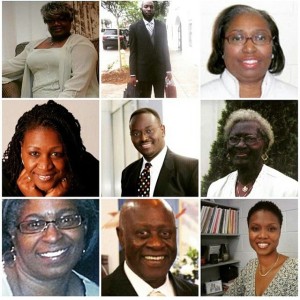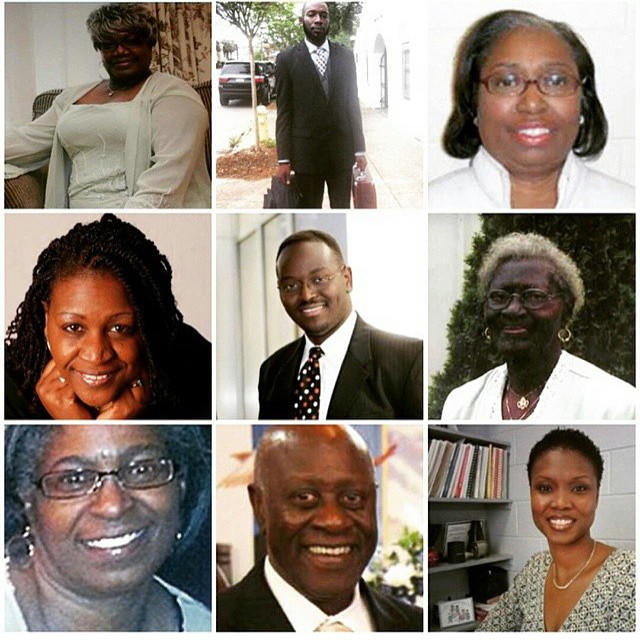It’s been a while since I have posted here. Most of the reasons are personal: I was  finishing a book manuscript and trying to get a cookie business off the ground. Over the past several weeks, there have been several times I thought about writing in response to tragedy around the country, but I didn’t either because I felt like someone else was saying what I wanted to contribute or I didn’t want to add to the noise, so I remained silent.
finishing a book manuscript and trying to get a cookie business off the ground. Over the past several weeks, there have been several times I thought about writing in response to tragedy around the country, but I didn’t either because I felt like someone else was saying what I wanted to contribute or I didn’t want to add to the noise, so I remained silent.
As I sat in church this morning and we prayed for the people at Emmanuel AME Church in Charleston, one of the phrases uttered, which I have heard often these past few days, is we need to “break the silence,” and I thought I need to speak up even if I am just preaching to the choir, or it has already been said.
Two things about Dylann Storm Roof struck me from the first, other than his middle name: one was the Rhodesian patch on his jacket and the other was his words about the blacks “taking over.” When I was one year old, my parents and I moved to Bulawayo, Southern Rhodesia, which was a British colony at the time. As independence loomed, Ian Smith and his party of White Supremacists made it evident that racism would rule the day, so my parents moved to Northern Rhodesia, which became Zambia, a truly democratic and African state. There was nothing to emulate or respect about Ian Smith’s government. They turned their fear into power and, in turn, set the stage for Robert Mugabe to do the same in reverse. The kind of oppression the Rhodesian government pressed on the African majority, similar to that of South Africa’s apartheid regime is evil because it makes control an ultimate value and sets up a system that dehumanizes everyone and destroys the possibility of relationship. I turn to my friend, Tim Tyson’s comments in regards to Roof’s concern about losing control.
Dylann Roof told his victims that he came to kill black people because they are “raping our women and taking over our country.” Both claims date back to the white supremacy campaigns of the 1890s, one of which overthrew the government of North Carolina, by the way. These ideas did not just percolate up inside of his mind; this is not ordinary “bias” or suspicion of people different from him; someone had to teach him these elaborated historical traditions. (Watered down versions of them are ordinary enough in mainstream politics.) He gunned down nine people at a historic black church, historic enough that he might well have selected it intentionally; Emanuel AME has been at the center of the civil rights struggle since the early 19th century. The Denmark Vesey slave rebellion of 1822 was organized out of this church, and the slave revolt that it was designed to launch was planned to occur on June 16–the anniversary of Dylann Roof’s massacre; of course, there is no evidence that he knew this history, but no evidence that he didn’t, either.
Roof said he wanted to start a race war; this is a common theme among white supremacists and depicted in their favorite book, The Turner Diaries, which also helped inspire Timothy McVeigh to commit the Oklahoma City bombings. He is part of something, and something dangerous. America in general and South Carolina in particular are generously sprinkled with white supremacist groups. (In Shelby, where he was caught, the White Patriot Party committed a mass murder some years back; the man who ordered that murder committed mass murder at a synagogue in Kansas City only a few years ago. The road Dylann Roof was captured on, Thomas Dixon Blvd, was named after perhaps the most illustrious white supremacist in the history of the world, apart from Hitler, though there is no evidence he knew this, of course, nor that he didn’t.) Roof’s probable mental frailty most likely have made him susceptible such influences. It’s almost certainly both/and with respect to mental illness and white supremacy, but there is at least as much evidence for the latter as for the former.
What Dylann Storm Roof did was racist and evil. Though he acted alone, the fact that the South Carolina legislature both allows the Confederate flag to fly and did not even go so far as to lower it half-staff shows his racist attitudes are far from solitary. As Jon Stewart said, the roads in South Carolina are named after Confederate generals. In my state of North Carolina they just changed the name of Saunders Hall on the UNC campus because it was named for a nineteenth century KKK leader. Those however are the obvious connections. The predominantly white legislature in my state have torn apart the Voting Rights Act, requiring voter identification and shortening early voting availability because too many nonwhite voters were going to the polls. (They give other reasons, but the impact speaks for itself.) The gerrymandering of congressional districts is racist, pure and simple. Not just partisan. Racist. The point is to make sure whites stay in control.
The language of control and safety plays well because it is fear based, and fear has been the common currency of American politics since 9/11. The justification for the actions of police in Ferguson and Staten Island and Charleston and McKinney has been one of control: they were enforcing order. The other cop on the video in McKinney who actually talked and listened to the teenagers demonstrates another way. The point of life is not to be in control or to dominate; the point is to be together.
Evil is intentional. Those who would explain away what Dylann did are making a loud statement about their own worldview. Ginger says often we are called to choose relationship over doctrine. Let us also choose relationship over politics, over privilege, over control, over safety. Roof’s intentional act of terrorism reminds me that I am called to more than random acts of kindness. Love is a choice. Love is intention incarnate. If evil is real, then love is real-er.
The nine who were murdered in Charleston were just going to church, as were the four little girls killed at Sixteenth Street Baptist Church in Birmingham in the sixties. Dylann Storm Roof was welcomed because the people at Emmanuel AME intentionally welcomed strangers into their midst. I heard their former pastor interviewed on NPR this week and the reporter asked if this would change the open door policy of the church. His response, as I remember it, was to say no: they keep the doors open because of who they are, not because of who comes in.
The church in Charleston bears my favorite name for Jesus: Emmanuel—God With Us. In the Incarnation, God identified with humanity and called us to do the same with one another with intention, speaking the truth in love, and choosing relationship over any other option. May we choose to be fully human all that we say and do with and to one another. May we choose to live beyond our fear and trust one another in love.
Peace
Milton

welcome back.
Milton – Thank you for sharing your insight with us. I am reminded of the words that resonate with those affected by the Sandy Hook shootings – “Love Wins”
Thank you, Milton, for breaking your silence. May we each do the same.
Loved this! You are articulating beautifully what many of us believe. I aspire to be able to express myself as beautiful! Thank you for sharing your heart with the world.
Brilliant, Milton. Thank you
I agree Mary Anna, Brilliant. Thanks Milton, well said.
Brilliant. Thoughtful. Truth. Amen.
Thank you, Milton.